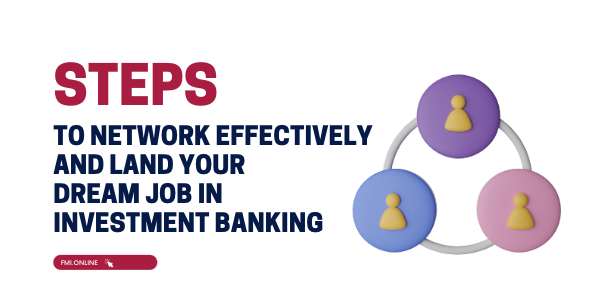Due to its lucrative salaries and promising growth prospects, investment banking attracts thousands of candidates with similar backgrounds. Hence, simply submitting a resume will not guarantee you an interview. However, a referral from a banker at your target investment banks will make you stand out from the crowd. A candidate might have to invest plenty of time developing these relationships with bankers to obtain the required referrals. This becomes even more important if you are not from a top tier school, which are generally targeted by investment bankers, or are in off-cycle recruiting. As a candidate, the purpose of networking for you should be securing entry-level internships, investment banking interviews, and job offers. Let’s explore the steps to network effectively and land your dream investment banking job.
Step 1: Selection
You must start with a top down approach and make a comprehensive list of bankers that you could reach out to. After researching, you must be able to narrow down your list to 80-100 names of bankers with whom you want to connect. It’s important to reach out to a broader set of bankers to improve your odds. Make sure that your list is even broader if you are a student from a non-target school.
Step 2: Getting contact information
Once you are ready with your list of names, you must find a way to convey your message to them. The best way to reach out to the banker is through LinkedIn. You can send them a connect request along with a brief message stating the purpose of reaching out. Moreover, you can also use the ‘Inmail’ feature to convey your message. Another way of reaching out could be via email. However, it is possible that your email would be blocked by the company firewall if you are using their corporate email address. If the email ends up in their inbox, these bankers will also be targeted by other candidates, so you must contact them in a way that differentiates you and makes them want to respond to you.
Step 3: Coming up with a professional and brief email
In order to receive a response, your email must have a compelling subject line and a concise body. The purpose of writing this email is to secure a meeting with the banker. So, you need to ask them to take a moment to talk on the phone or in person at their convenience. To increase the chances of setting up the meeting and making it easy for them, you can show your flexibility in terms of when and where to conduct the meeting.
Step 4: Preparation
If you get a positive response, you must prepare for the meeting. Start by researching about the bank, the banker, department, role, etc. and repeat this for each of your meetings/conversations. Thoughtful questions will help you stand out among other candidates and thus, would increase your chances of getting a referral. It is common for candidates to feel nervous before these conversations but keep in mind that they are equally passionate about the job and the industry as you are and happen to have more experience than you. Most importantly, you must show that you are open and willing to learn more about the industry.
Step 5: Stay in touch
The ultimate goal of every interaction is to get a referral for an interview. Once you’ve established a connection, you must follow up and make sure your good conversations translate into referrals. You should also stay in touch periodically to make sure you come across as genuine and keen to work in the industry.
Networking Strategies
There are three main strategies for networking in investment banking:
- Attending networking events or conducting informational interviews to build connections over time.
- Cold emailing/messaging where you directly ask about open positions or strike up a conversation with an intention to get a referral.
- Cold calling, same as cold emailing, but on the phone.
Conclusion
Networking is one of the key tools that many people use to start their careers in investment banking. You will be able to stand out and increase your chances of getting an interview if you make a good impression on people who can recommend you to recruiters or hire you. Along with getting a referral or an interview, you get to know other investment bankers on a more personal level. Keeping a positive and friendly tone, asking for what you want directly, and being proactive will ensure that your networking efforts reap benefits.












 60+ hours
60+ hours 9 courses
9 courses



